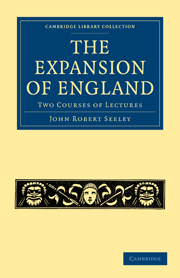Book contents
- Frontmatter
- PREFACE
- Contents
- COURSE I
- LECTURE I TENDENCY IN ENGLISH HISTORY
- LECTURE II ENGLAND IN THE EIGHTEENTH CENTURY
- LECTURE III THE EMPIRE
- LECTURE IV THE OLD COLONIAL SYSTEM
- LECTURE V EFFECT OF THE NEW WORLD ON THE OLD
- LECTURE VI COMMERCE AND WAR
- LECTURE VII PHASES OF EXPANSION
- LECTURE VIII SCHISM IN GREATER BRITAIN
- COURSE II
LECTURE VIII - SCHISM IN GREATER BRITAIN
Published online by Cambridge University Press: 05 August 2011
- Frontmatter
- PREFACE
- Contents
- COURSE I
- LECTURE I TENDENCY IN ENGLISH HISTORY
- LECTURE II ENGLAND IN THE EIGHTEENTH CENTURY
- LECTURE III THE EMPIRE
- LECTURE IV THE OLD COLONIAL SYSTEM
- LECTURE V EFFECT OF THE NEW WORLD ON THE OLD
- LECTURE VI COMMERCE AND WAR
- LECTURE VII PHASES OF EXPANSION
- LECTURE VIII SCHISM IN GREATER BRITAIN
- COURSE II
Summary
As objects change their outline when the observer changes his point of view, so the history of a state may be made to take many forms. The outline I have given of English history in the seventeenth and eighteenth centuries is very different from that with which we are familiar, because I have taken a point of view from which many things seem great that before seemed small and many small that seemed great, while some things are now outline that were shading and others are shading that were outline.
And yet most people think of history as if its outline were quite fixed and unalterable. Details, they think, may be more or less accurate, more or less vivid, in this historian or in that, but the framework must be the same for all historians. In reality it is just this framework, the list of great events which children learn by heart, that is unfixed, unstable, alterable, though it seems made of cast-iron. For what makes an event great or little? Is the accession of a king necessarily a great event? At the moment it seems great, but when the excitement it causes has subsided it may appear to have been in the history of the country no event at all.
- Type
- Chapter
- Information
- The Expansion of EnglandTwo Courses of Lectures, pp. 141 - 160Publisher: Cambridge University PressPrint publication year: 2010First published in: 1883

